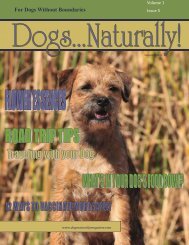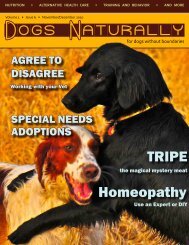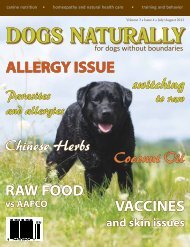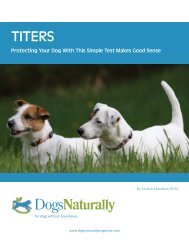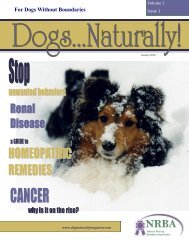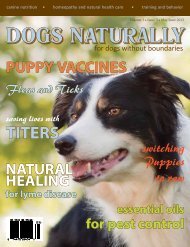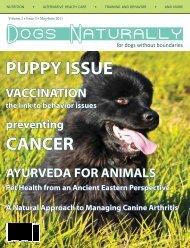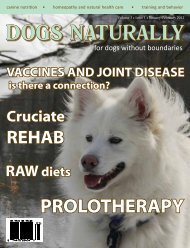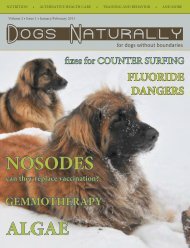July/August 2010 - Dogs Naturally Magazine
July/August 2010 - Dogs Naturally Magazine
July/August 2010 - Dogs Naturally Magazine
Create successful ePaper yourself
Turn your PDF publications into a flip-book with our unique Google optimized e-Paper software.
scraps of food, the street dogs were everywhere.<br />
These potcakes, named after<br />
the leftover rice cake from the traditional<br />
Bahamian peas and rice dish, were starving,<br />
sick and abandoned. Litters of puppies<br />
lived under the houses, and were<br />
left completely on their own.<br />
Never had I seen so many starving, sick<br />
and abandoned dogs and cats in my life.<br />
Every time I rode a bike or walked into<br />
the village, I saw feral strays digging in<br />
the trash or cruising dangerously next to<br />
the road. Puppies were everywhere,<br />
and they also ventured near the cars.<br />
Many were killed, only to be left there<br />
to rot.<br />
The facts relating to animal control on<br />
Grand Bahama are sobering. There is<br />
no animal control agency; the only organization<br />
that deals with feral potcakes<br />
is The Humane Society of Grand<br />
Bahama in Freeport. It is difficult to get<br />
a van to leave Freeport and drive all the<br />
way out to West End to take the dogs to<br />
the shelter. Moreover, many feral potcakes<br />
are so wild that they can never<br />
trust a human, or be rehabilitated.<br />
The last, chilling fact about Grand Bahamas'<br />
animals was that the shelter was a<br />
high-kill facility, with a 95% euthanasia<br />
rate. The advent of the hurricanes aggravated<br />
an existing problem; by 2005<br />
more animals than ever were put to<br />
sleep.<br />
Deeply moved to do something, I contacted<br />
the Manager of the Humane<br />
Society of Grand Bahama, Tip Burrows.<br />
I explained that I wanted to help, that<br />
visiting her country with its animal<br />
problems was emotionally draining for<br />
me. I felt a sense of urgency to give<br />
back to these gentle canines, and ease<br />
their plight.<br />
The good news was that I had already<br />
started a 501(c) (3) non-profit in Colorado<br />
to help West End youth with college<br />
funding two years earlier in 2002.<br />
That enabled me to wrap the animal<br />
welfare efforts into an existing organization:<br />
The Kohn Foundation. We called<br />
our new offspring BARC for the Bahamian<br />
Animal Rescue Committee.<br />
This was the beginning of a very powerful<br />
partnership with The Kohn Foundation/BARC<br />
and The Humane Society.<br />
Now our animal welfare efforts had an<br />
official title and role in the non-profit. It<br />
was a bit daunting to start completely<br />
from scratch, but the effort garnered its<br />
own momentum.<br />
I asked everyone I knew to send them<br />
money. Little by little funds came in and<br />
then it began to explode. Our grassroots<br />
organization was making progress. We<br />
were making a difference in the lives of<br />
Grand Bahamas' potcakes, and it felt<br />
great.<br />
In 2007, The Kohn Foundation helped<br />
raise money for the first major spay/<br />
neuter initiative on Grand Bahama. Over<br />
18 veterinarians and techs paid their way<br />
and donated their vacation time to perform<br />
surgery. The result was more than<br />
300 sterilizations in a week, with additional<br />
amputations and emergency surgeries.<br />
www.dogsnaturallymagazine.com <strong>July</strong>/<strong>August</strong> <strong>2010</strong> | 13



